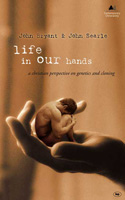
Science fact sometimes looks more like science fiction. GM technology is already embedded in drug manufacture and in agriculture. Soon we may be able to alter the genetic make-up of our unborn children: the technology is now available for human gene therapy and even cloning. Furthermore, spare body-parts may one day be grown from human embryonic cells.
With these unprecedented choices comes a minefield of complex ethical questions. What are appropriate uses for genetic modification? What is the status of the human embryo? How can we maintain proper regard for the creation? Are we 'playing God' or simply using our God-given talents? In this bewildering maze there is no consensus about right and wrong. Ethical debates are dominated by pragmatism and concern for individual rights.
Biological scientist John Bryant and doctor/pastor John Searle believe it is essential that we apply the teachings of Jesus to the dilemmas that arise from modern biological science. Approaching the Bible and the field of biotechnology with equal rigour they explore how Christians can make balanced ethical decisions in the current cultural and social climate.
With these unprecedented choices comes a minefield of complex ethical questions. What are appropriate uses for genetic modification? What is the status of the human embryo? How can we maintain proper regard for the creation? Are we 'playing God' or simply using our God-given talents? In this bewildering maze there is no consensus about right and wrong. Ethical debates are dominated by pragmatism and concern for individual rights.
Biological scientist John Bryant and doctor/pastor John Searle believe it is essential that we apply the teachings of Jesus to the dilemmas that arise from modern biological science. Approaching the Bible and the field of biotechnology with equal rigour they explore how Christians can make balanced ethical decisions in the current cultural and social climate.


